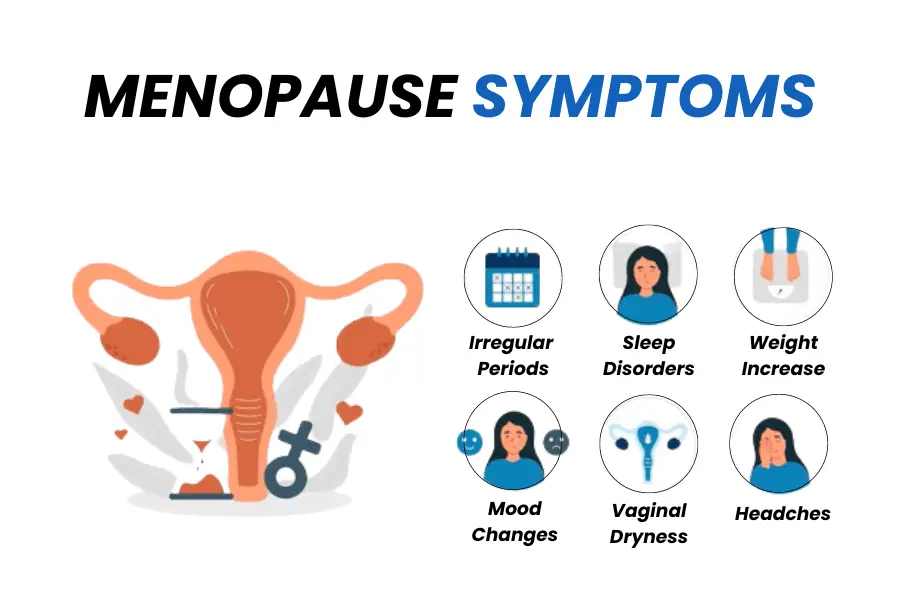PERIMENOPAUSE SERVICES

The period of a woman’s life prior to menopause is known as the perimenopause, often referred to as the menopausal transition. Menopause, which signifies the end of a woman’s reproductive years, is defined as the cessation of menstrual cycles for at least 12 consecutive months. The perimenopause normally begins a few years before to the actual menopause and can endure for various amounts of time until stopping once menopause is reached.
A woman’s ovaries gradually generate less estrogen, the hormone in charge of controlling the menstrual cycle and several aspects of reproductive health, throughout the perimenopause stage. Several other physical and mental symptoms, such as the following, may result from this hormone shift:
- Irregular menstrual cycles: Women’s menstrual cycles may become more or less frequent or longer. There may be missing periods as well as periods that get heavier or lighter.
- Hot flashes and night sweats: These frequent symptoms include brief but severe feelings of heat that are frequently accompanied by sweating and a frenzied heartbeat.
- Vaginal and urinary alterations: Due to changes in the vaginal and urinary tract tissues, some women may experience vaginal dryness, discomfort during sexual activity, and an increased risk of urinary tract infections.
- Mood swings and emotional changes: In some women, hormonal changes can lead to melancholy, anger, anxiety, and mood swings.
- Sleep issues: Many perimenopausal women may have trouble sleeping or notice changes in their sleep patterns.
- Libido changes: Some women may experience a decline in their desire for sex or modifications to their sexual behavior.
- Physical symptoms: Physical changes including weight gain, changes in skin and hair, and joint discomfort can also be an indication of perimenopause.
It’s crucial to remember that each woman will experience perimenopausal symptoms differently, both in terms of their intensity and duration. While some women may only have minor symptoms, others may find them to be more bothersome and seek therapy or medical guidance.
Hormone replacement therapy (HRT) or other drugs, as well as lifestyle changes including adopting a healthy diet and exercise routine, may be used to treat perimenopausal symptoms. Women who are nearing or going through perimenopause must speak with a healthcare professional to discuss their specific symptoms and, if necessary, create an individualized treatment plan. A smooth transition from perimenopause to menopause can be ensured with regular check-ups and monitoring.
Q & A About perimenopause and Menopause
Menopause: What is it?
Your menstrual cycles will stop during the menopause phase of your life. It often occurs in the latter part of your 40s or the beginning of your 50s, however it may occur sooner if you’ve had a hysterectomy or have a condition known as primary ovarian insufficiency.
You can no longer become pregnant, and you cease having periods and many of the symptoms and side effects that go along with them. When you have gone 12 complete months without a period, you have officially entered menopause.
Perimenopause is a phase that precedes menopause. When people discuss menopause symptoms, they typically refer to the perimenopause-related symptoms.
Your hormone levels are often declining and fluctuating regularly during this period. This may lead to a number of unexpected symptoms and problems, which may prompt you to seek medical attention.
What signs or symptoms accompany menopause?

Average perimenopause lasts seven years, although it can last up to fourteen. You might encounter uncomfortable symptoms at this time that have an impact on your relationships, sleep, and emotions.
In this situation, you shouldn’t be reluctant to get help. The hormone changes that lead to menopause symptoms can be effectively treated by a number of methods by Dr Asha Sharma.
Before menopause, common signs and symptoms include:
- Weight fluctuations;
- Night sweats;
- Night chills;
- Memory and concentration problems;
- Insomnia;
- Mood swings;
- Pain during sex;
- Vaginal dryness
Before they end entirely, you can still receive the occasional period. You can still become pregnant at this time, even though your periods are irregular and you’re close to menopause, so you should keep using contraceptives if you want to avoid becoming pregnant.
Is the menopause curable?
Your hormone levels can be controlled by the gynaecologist to lessen symptoms associated with menopause and perimenopause. You might be able to get hormone therapy using bioidentical hormones or conventional hormone therapy if you don’t want these symptoms to interfere with your life.
Traditional hormone therapy using synthetic hormones differs slightly from bioidentical hormone therapy. Bioidentical hormones are derived from plants and work in a manner that is identical to that of your own natural hormones. Generally speaking, they cause less difficulties and adverse effects than their synthetic counterparts.
Hormones are available in a variety of forms, such as patches, creams, pellets, and pills. Your doctor gives the lowest dose of hormones feasible to ease your menopause symptoms and instructs you on how to use them successfully.
Your healthcare professional might suggest vaginal revitalization with a non-surgical vaginal laser therapy in-office, if you experience urine incontinence or vaginal atrophy as a result of menopause.
Arrange your consultation with Dr Asha Sharma if you are approaching menopause and are experiencing symptoms that are interfering with your career, relationships, or sleep.
